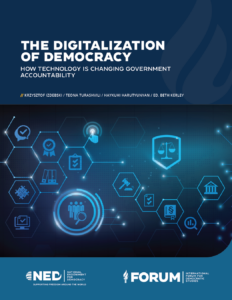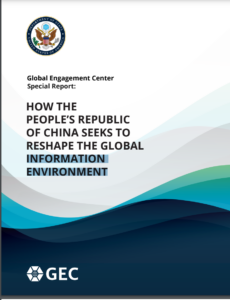How do you we place democratic principles at the base of creating a digital future so it works for the broadest group of citizens around the world?
“That is a a North Star that guides a lot of our programming,” said Damon Wilson, President and CEO of the National Endowment for Democracy (NED) at this week’s summit of the Special Competitive Studies Project. It is the openness of democratic societies that embrace decentralization, innovation and entrepreneurship that “give us a leg up” in trying to figure out how to leverage technology for democracy and counter digital authoritarians, he told a panel on The Future of Democracy Assistance.
 It’s refreshing to hear that NED’s approach is one of humility, recognizing that innovation and adaptation will likely come from activists in the field rather than experts in DC, said moderator Bonnie Glick, former Deputy Administrator and COO at the United States Agency for International Development.
It’s refreshing to hear that NED’s approach is one of humility, recognizing that innovation and adaptation will likely come from activists in the field rather than experts in DC, said moderator Bonnie Glick, former Deputy Administrator and COO at the United States Agency for International Development.
The National Democratic Institute’s approach it is “to focus not necessarily on the technological tools themselves but the actual processes of democracy,” said NDI board member Shanthi Kalathil. NDI relies on “those core values of transparency, accountability participation and inclusion to help partners overseas harness these technologies in their own work to uphold democracy and liberal values.”
NDI supports along with others in the NED family a group of Internet activists called the open internet leaders who work on the ground in their own countries to make sure that their laws and regulations are ones that best shape technology in a way that is most conducive to democratic values, Kalathil added.
 “The conversation around emerging technology has focused a lot on the Oppenheimer side of the equation which is how do we avoid that existential moment beyond which there’s no return,” said Kalathil. “But the conversation around democracy and technology is a little bit more towards the other side the Barbie side of the spectrum if you will where we talk about how we want to live our lives.”
“The conversation around emerging technology has focused a lot on the Oppenheimer side of the equation which is how do we avoid that existential moment beyond which there’s no return,” said Kalathil. “But the conversation around democracy and technology is a little bit more towards the other side the Barbie side of the spectrum if you will where we talk about how we want to live our lives.”
“Learning from others” is critical, said Daniel Twining, President of the International Republican Institute. “Taiwan has an incredible civic tech community that is world class in helping protect its open society in the digital realm,” he said, especially in the face of China’s aggressive information operations.
For the first time in human history we’ll be living in a world that is broadly middle class, he added, “a world that is broadly composed not of a pyramid with a tiny elite at the top and a broad base of impoverished souls below but a world that looks like a diamond.”
Productivity is the key, said Twining: if we can live in a broadly middle class world empowered by technology it’s a game changer for governance for prosperity for all forms of opportunity and that’s the world we should be working for.”








